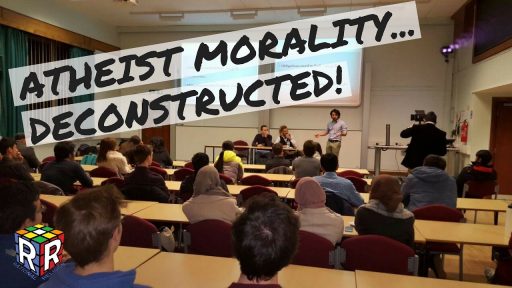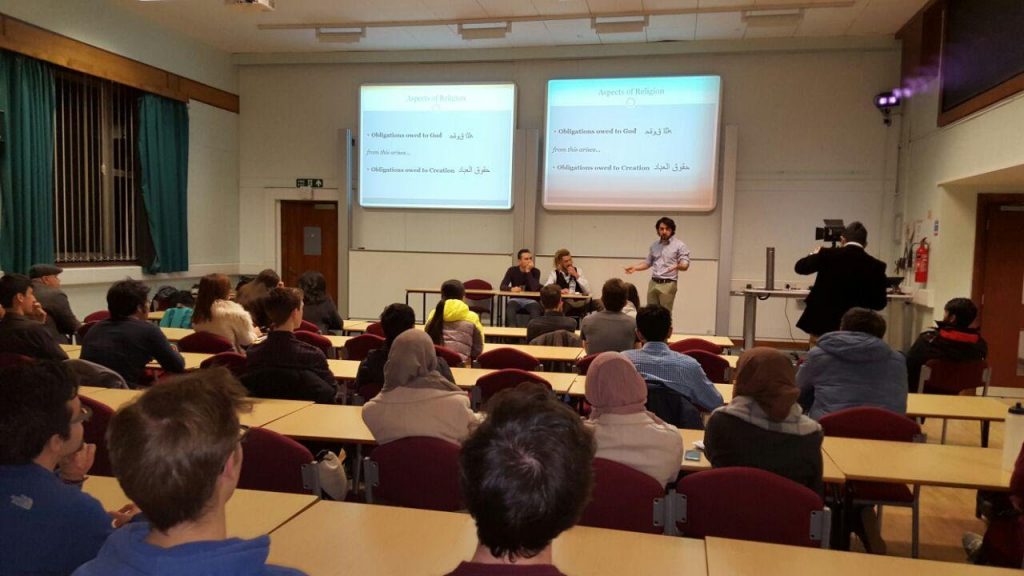With the recent controversy over whether Humanism should be taught in UK RE classes, this belief system is getting more attention than it’s ever done. We thought we’d help out the British Humanist Association with their policy of promoting critical thought around Humanism by publishing a series of posts examining whether Humanism makes any sense at all. Enjoy!
~Humanism & its Discontents: Part 6~
Good God, morality can be a tricky subject for atheists, can’t it? Doesn’t it have a lingering whiff of pointlessness to it? Isn’t it completely relative to an individual’s whims and opinions, with no ultimate moral model to which we can conform? Despite the fact that morality has no ultimate purpose or real direction in an atheistic worldview, humanists will often still insist that morality is worth following because it’s good for society as a whole. “No man is an island,” they say with great gusto. “Morality helps us to produce a society that is more prosperous, freer, more educated, and without that we’d all be unhappy.” That is, morality is justified for our collective welfare. If we lost morality we’d be a society of criminals and vagabonds. Thus, individual morality is necessary to produce a happy society overall. All for one and one for all!
The problem is that this knowledge doesn’t make a very compelling case for individual morality. When you lay out this motivation it looks something like this:
- I want to be happy.
- If I’m moral, I’ll create a law-abiding, and prosperous society.
- If I create a law-abiding, prosperous society then I can achieve my ultimate goal of individual happiness.
Of course, the problem with this is that it starts and ends with the same goal—individual benefit. And if that’s the case, why should we, as individuals, bother doing good for the abstract concept of social cohesion, when in the here-and-now I can be immoral, and get whatever I want quicker than if I was moral? Yes, if everyone did the same, then society would look pretty shabby, but who cares? The whole point of a moral society is to benefit individuals, so why don’t I just cut out the middle-man and do what makes me happy now?
Let me give you an example:
Richard was once a brilliant zoologist, but now he’s struggling for recognition and relevance in public life. He lives in a nice apartment. He’s paid his way through the years. He figures that for once, he deserves to treat himself. So he’s saved up for some repairs on his new yacht from the old book sales money that’s been trickling in. He’s just gotten out the £3000 and is just leaving to buy the needful when all of a sudden his buddy Lawrence turns up at his door. Lawrence is an astrophysicist and popular science author, whose own book sales have been plummeting since a terrible review in the New York Times. In the meantime, he’s struggling with his finances and needs some money. £3000 to be exact. He doesn’t know when he’ll be able to repay Richard either.

Richard is an atheist. He’s quite sure that the only reason morality evolved was so that his own interests could be furthered through creating a bountiful and wealthy society. With this reasoning, he wants to help Lawrence, he really does, but when he thinks it through, he just can’t see the logic. Why give up £3000 to someone else, just to create a society in which he would be able to accumulate £3000 to fulfill his desires? After all, a bird in the hand is worth two in the bush. It just doesn’t make sense.
So he tells Lawrence that he doesn’t have the money. He knows lying is termed “bad” but after all, he doesn’t want to burn his bridges in case he needs some help from Lawrence in the future!
The failure of this atheistic logic is evident not just in hypothetical examples but in real-world examples too. Take Communism—an atheistic philosophy that sought to re-construct the basis of morality on the idea of collective benefit. Why was it that Communism failed? There were certainly many reasons, but one basic reason is that collective benefit has no persuasive power upon the human psyche. Collective benefit was and is impotent in motivating humans to sacrifice their own interests for others, without the binding commonality provided by a belief in a Creator, the concept of accountability and an ultimate purpose, which doing good to others serves.
This idea was best elucidated by his holiness Mirza Tahir Ahmad, in his book “Islam’s Response to Contemporary Issues”:

“The vacuum created by the non-existence of God is suddenly filled by man’s ego. It is a very naive and extremely ignorant philosophy that man can live without God. What atheism ultimately achieves is not just the death of one God but it suddenly brings to life a myriad of gods. Every conscious being that exists, suddenly acquires the role of a god unto himself or itself. Ego, selfishness and the total commitment to serve one’s own ends grow stronger and all-powerful.
Societies, which are built with the bricks of such individuals, always remain egoistic and self-oriented. There is no logic left in being beneficial to others without an ulterior motive. There is no external reference point left in the form of a beneficent God, who is the only binding and meeting point of all forms of creation. This is the ultimate Islamic philosophy. Without returning to God one cannot attain peace and without that peace, peace in society cannot be built. All human efforts to create peace from selfish ulterior motives are bound to fail and come to nothing. If there is no God, there is no peace. That is the ultimate wisdom.”











5
4.5